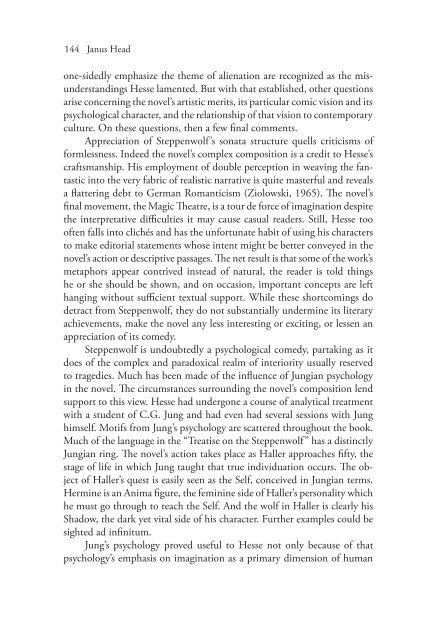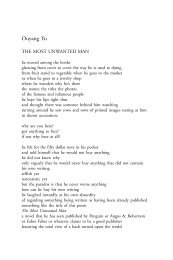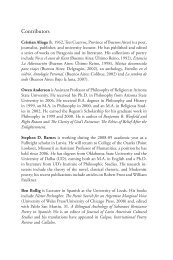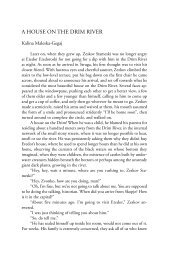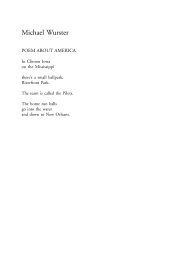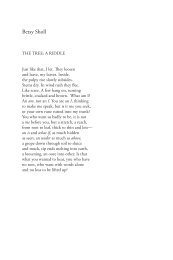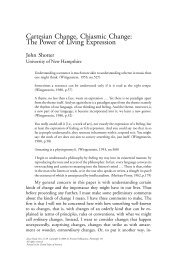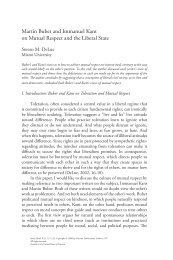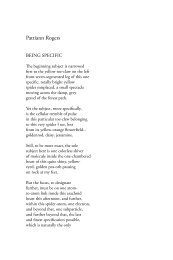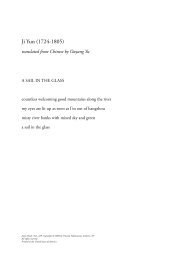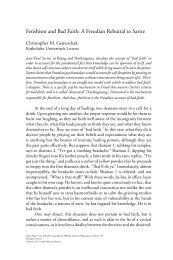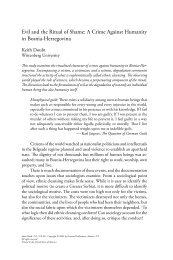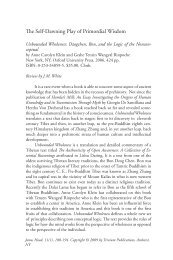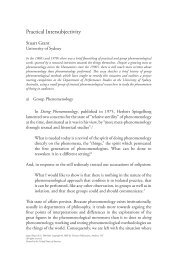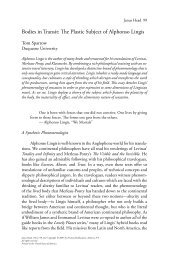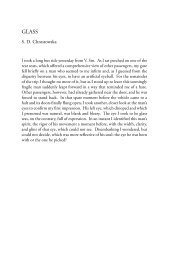Hesse's Steppenwolf: A Comic-Psychological ... - Janus Head
Hesse's Steppenwolf: A Comic-Psychological ... - Janus Head
Hesse's Steppenwolf: A Comic-Psychological ... - Janus Head
Create successful ePaper yourself
Turn your PDF publications into a flip-book with our unique Google optimized e-Paper software.
144 <strong>Janus</strong> <strong>Head</strong><br />
one-sidedly emphasize the theme of alienation are recognized as the misunderstandings<br />
Hesse lamented. But with that established, other questions<br />
arise concerning the novel’s artistic merits, its particular comic vision and its<br />
psychological character, and the relationship of that vision to contemporary<br />
culture. On these questions, then a few final comments.<br />
Appreciation of <strong>Steppenwolf</strong>’s sonata structure quells criticisms of<br />
formlessness. Indeed the novel’s complex composition is a credit to Hesse’s<br />
craftsmanship. His employment of double perception in weaving the fantastic<br />
into the very fabric of realistic narrative is quite masterful and reveals<br />
a flattering debt to German Romanticism (Ziolowski, 1965). �e novel’s<br />
final movement, the Magic �eatre, is a tour de force of imagination despite<br />
the interpretative difficulties it may cause casual readers. Still, Hesse too<br />
often falls into clichés and has the unfortunate habit of using his characters<br />
to make editorial statements whose intent might be better conveyed in the<br />
novel’s action or descriptive passages. �e net result is that some of the work’s<br />
metaphors appear contrived instead of natural, the reader is told things<br />
he or she should be shown, and on occasion, important concepts are left<br />
hanging without sufficient textual support. While these shortcomings do<br />
detract from <strong>Steppenwolf</strong>, they do not substantially undermine its literary<br />
achievements, make the novel any less interesting or exciting, or lessen an<br />
appreciation of its comedy.<br />
<strong>Steppenwolf</strong> is undoubtedly a psychological comedy, partaking as it<br />
does of the complex and paradoxical realm of interiority usually reserved<br />
to tragedies. Much has been made of the influence of Jungian psychology<br />
in the novel. �e circumstances surrounding the novel’s composition lend<br />
support to this view. Hesse had undergone a course of analytical treatment<br />
with a student of C.G. Jung and had even had several sessions with Jung<br />
himself. Motifs from Jung’s psychology are scattered throughout the book.<br />
Much of the language in the “Treatise on the <strong>Steppenwolf</strong>” has a distinctly<br />
Jungian ring. �e novel’s action takes place as Haller approaches fifty, the<br />
stage of life in which Jung taught that true individuation occurs. �e object<br />
of Haller’s quest is easily seen as the Self, conceived in Jungian terms.<br />
Hermine is an Anima figure, the feminine side of Haller’s personality which<br />
he must go through to reach the Self. And the wolf in Haller is clearly his<br />
Shadow, the dark yet vital side of his character. Further examples could be<br />
sighted ad infinitum.<br />
Jung’s psychology proved useful to Hesse not only because of that<br />
psychology’s emphasis on imagination as a primary dimension of human


